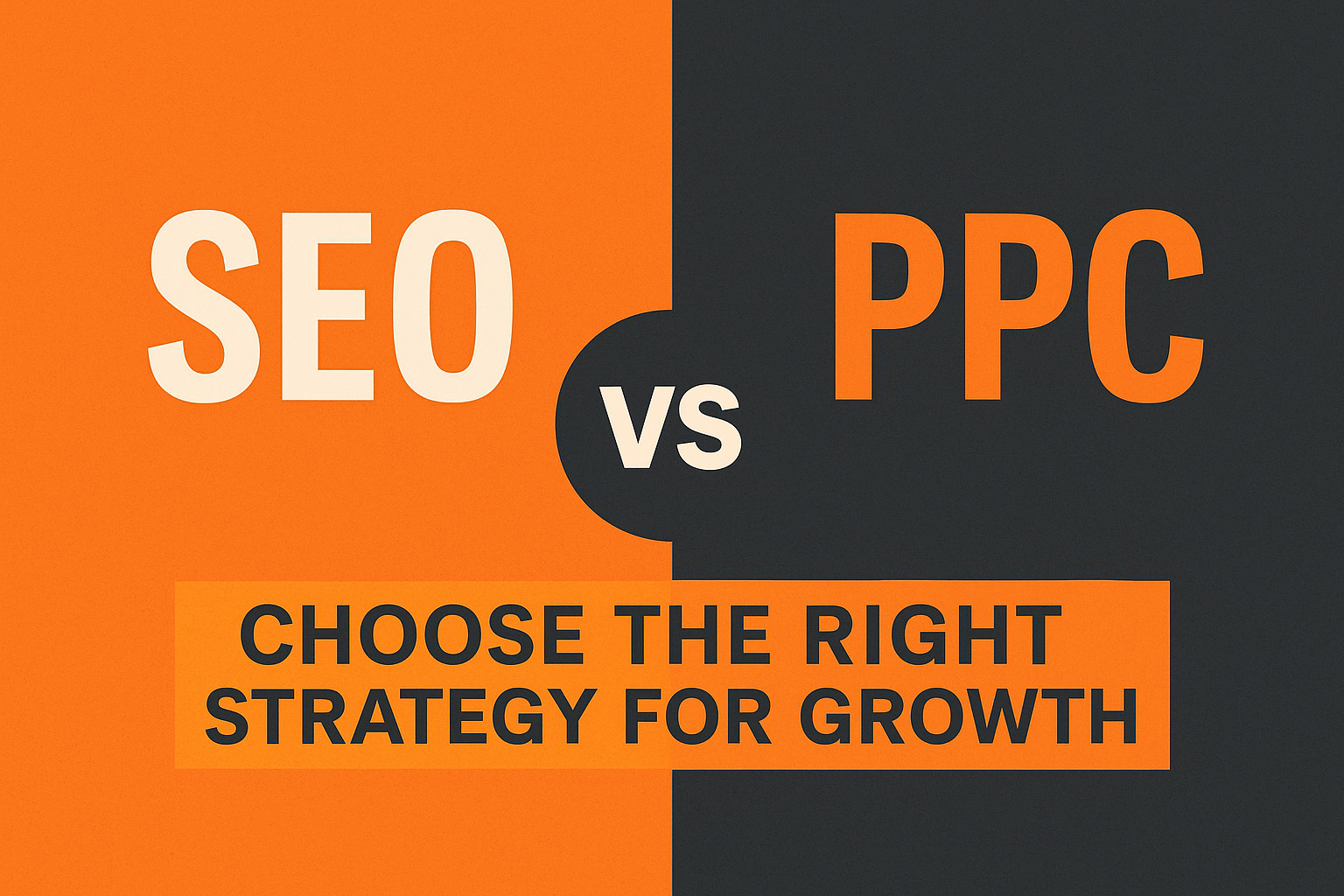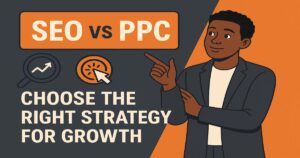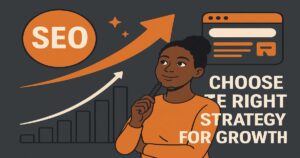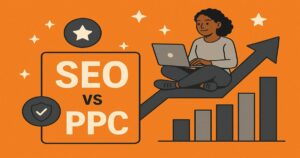Introduction
SEO vs PPC, which should you choose? Choosing the right digital marketing strategy can make or break your growth in 2025. This guide breaks down both methods so you can make a smart, informed decision.
Whether you’re a startup owner or running a well-established brand, selecting the most effective strategy—SEO vs PPC—could significantly impact your marketing success. Each approach has unique strengths, costs, and returns. Let’s dive into how both can fit into your growth plan.
What Is SEO?
Definition and How It Works
Search Engine Optimization (SEO) is the practice of enhancing your website to increase its visibility in organic search engine results. It includes:
- Keyword research
- Content optimization
- Technical enhancements
- Backlink building
SEO operates on the principle of relevance and authority. Search engines prioritize pages that best match the user’s intent and demonstrate domain credibility.
Long-Term Benefits
- Establishes credibility and authority
- Attracts consistent, high-quality traffic
- Delivers compounding returns over time
- Reduces customer acquisition cost
- Builds sustainable traffic sources without ongoing spend
When to Use SEO
- You have a long-term growth horizon
- You want to reduce dependency on paid ads
- You’re focused on building brand equity
- You’re targeting research-heavy buyer journeys
Explore more via Nesace’s professional SEO services.
What Is PPC?
Definition and Types
Pay-Per-Click (PPC) advertising allows you to display ads on platforms like Google and Bing, paying only when users click.
Main PPC Platforms
- Google Ads: Search, Display, Shopping
- Bing Ads: Similar reach, lower competition
- Paid Social: Facebook, Instagram, LinkedIn
PPC uses bidding systems and quality scores to determine ad placement and cost. Success often hinges on keyword relevance, ad copy quality, and landing page experience.
Immediate Traffic and Results
- Generate leads or sales instantly
- Quickly test offers and landing pages
- Precision targeting using demographics and behaviors
- Highly measurable and controllable
When to Use PPC
- Launching a new product or offer
- Competing in a saturated market
- Seeking fast visibility
- Targeting narrow or time-sensitive audiences
Read how to generate leads using Google Ads in Portland.
SEO vs PPC: Key Differences
| Feature | SEO | PPC |
|---|---|---|
| Cost | Time and content effort | Per click or impression |
| Results | Gradual, lasting | Immediate, short-lived |
| Longevity | Builds over time | Ends with budget |
| Trust Factor | High (organic) | Lower (ads) |
| Targeting Options | Limited | Advanced targeting |
| Learning Curve | High upfront | Ongoing optimization |
| Brand Awareness | Strong over time | Instant exposure |
Use Cases and Industry Scenarios
Small Businesses
- SEO: Ideal for building brand authority in your community
- PPC: Useful for quick bursts of local traffic
- Combo: Use PPC for offers and SEO for brand content
Ecommerce
- SEO: Boost category and product page rankings
- PPC: Promote flash sales or seasonal items
- Combo: Use retargeting ads and evergreen content
Local Services
- SEO: Rank in the Google Map Pack
- PPC: Use location-based targeting for immediate calls
- Combo: Maximize local reach by combining both
Competitive Markets
- SEO: Sustainable presence with content
- PPC: Outbid competitors temporarily
- Combo: Test with PPC, build with SEO
Want more tailored advice? Learn how to choose the best digital marketing agency.
Combined Strategy for Best Results
When to Integrate SEO and PPC
- Launch a new service with PPC, then scale with SEO
- Use PPC to test keywords, then build SEO pages for winners
- Retarget PPC visitors with SEO content offers
- Synchronize messages across organic and paid listings
Real-Life Examples
A local attorney firm in Oregon used PPC to acquire leads while optimizing blog content for “personal injury lawyer Hillsboro.” Within six months:
- Organic traffic doubled
- Paid ad spend reduced by 30%
- Cost per lead dropped by 45%
A fashion ecommerce store ran seasonal PPC ads while building SEO-rich landing pages for “summer dresses under \$100.” Sales increased 65% over the previous season.
Read more on full-service marketing for growing brands.
ROI Comparison
| Metric | SEO | PPC |
|---|---|---|
| Cost-per-Acquisition | Decreases over time | Increases with scale |
| ROI over 12 months | Higher | Moderate |
| Customer Retention | Strong due to trust | Needs retargeting |
| Brand Impact | High with content | Lower without brand focus |
| Flexibility | Slow adjustments | High agility with budget |
Common Pitfalls and How to Avoid Them
Budget Misalignment
- Balance short-term PPC needs with long-term SEO investments
- Track performance and adjust monthly
Keyword Cannibalization
- Avoid targeting the same keyword in both campaigns
- Use negative keywords in PPC to exclude organic terms
Weak Landing Pages
- Ensure PPC pages align with user intent
- Apply SEO best practices to improve conversion and rankings
Data Silos
- Sync learnings from both channels
- Use PPC search term reports to uncover SEO content gaps
Dive into more pitfalls in performance marketing strategy guides.
Key Takeaways
SEO offers sustainability. PPC offers speed. Use both based on goals and timelines to maximize returns.
- SEO for authority and long-term growth
- Use PPC for quick insights and lead surges
- Integrate both to balance short and long-term needs
- Always test, track, and tweak
Frequently Asked Questions
Which is cheaper, SEO or PPC?
SEO is more cost-effective long-term. PPC is more expensive but offers instant results.
Can I do both SEO and PPC?
Yes. It’s a common strategy to get fast wins and lasting growth.
How soon will I see results?
PPC: within days. SEO: 3 to 6 months for real traction.
What’s better for lead generation?
Use PPC for quick leads and SEO for nurturing over time.
What if my budget is small?
Start small with PPC campaigns, and invest in foundational SEO content monthly.
Does PPC help SEO rankings?
Indirectly. While PPC doesn’t affect rankings, the data can improve SEO targeting and strategy.
Conclusion
Both SEO and PPC are essential tools. Instead of picking one, build a strategy where they complement each other.
SEO gives you authority and long-term growth. PPC helps you test and scale fast. With proper balance, you’ll build a brand that gets found and converts.
Need help building your custom strategy? Contact Nesace Media for a free consultation.




